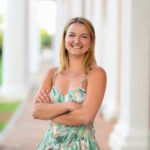Writing by Ana Dorta
Photography by Justin Negard
A Pound Ridge councilwoman and the program director for Creatives Want Change, Namasha Schelling spent her early childhood in Tanzania before moving to the U.S. With a Swiss father and a Tanzanian mother, Schelling grew up speaking English, Swiss-German, and Swahili (she’s no longer fluent in Swahili); she learned to speak French as an adult.
When and why did you immigrate to the United States?
I was 10 years old, and my father got a job working for the World Bank, so we moved as a family.
Was it difficult to get your green card?
We got a G-4 visa for the whole family, but when my parents returned to Tanzania, they applied for a green card for me. I do remember a pretty invasive doctor’s appointment in which they had to check for all kinds of interesting things, especially for a child, and I was a child when that process began. I must’ve gotten my green card sometime in my teenage years before my parents returned to Tanzania. I’m also a Swiss citizen. I only got my U.S. citizenship in 2014 with my husband, and that turned out to be a pretty easy process. We studied hard for that exam, and it turned out to be the most ridiculous exam ever. They asked us about 10 questions, and one was, “Who is the president of the United States?”
What was the hardest part about coming to the U.S.?
I think it was the culture shock. Leaving everything you know behind is difficult. I remember when we moved to Chevy Chase, we were the only kids that would play outside. We’d knock on neighbors’ doors and ask them if they’d want to come out. Eventually, they all started to play outside with us, and all the kids got to know each other. When we moved a year later, everyone knew each other and were like, “Wow, you really changed the neighborhood just by living here.”
What was the biggest culture shock when coming to the U.S?
I have a European background as well, so a lot of things were not that different, but a lot of things are different; the way we raise children, our cultural views are different. Here, in Pound Ridge, there are people from all over. When we lived on a farm in West Virginia, our neighbors often had never met an African. It was very different. They were farmers, and one neighbor could not read and write, but he got along so well with my mom. That’s the immigrant experience. In the end, no matter how different you are, there are so many similarities and such a hunger for getting to know each other.
Do you have any family in the U.S?
My husband, daughter and I are the only family here. My whole family is either in Switzerland or Tanzania. We are the sole Americans left. But we visit all the time—at least once a year.

Have you ever thought about moving back to Tanzania?
We would consider moving to Europe, not forever but for a few years. I would love for my daughter to go to an all-French school and live in an all-French environment.
Do people make assumptions about your heritage?
I think the difficult part of this conversation is that my dad is white and my mom is Black, so I’m mixed. That has been an interesting experience, because I think a lot of people assume that if you’re Black in America, your ancestors are slaves. I have a slightly different history, and that can be confusing for some people. I see the struggle that Black Americans have in this country, but I feel slightly removed because it is not in my history; I am exceedingly privileged. It can be difficult to reconcile that experience.
What would you like people to know about immigrants?
Immigrants have made this country what it is. There is no America without immigrants. We really need to support people who immigrate here. We have to be really careful not to fall for this new rhetoric of blaming everything on immigrants. This country was built on immigrants. They are generally the hardest-working people. All they want is to get the American dream, contribute to society and have their children well fed. That is the American dream. That is the promise of America. Hopefully, we can reclaim that identity.
This article was published in the July/August 2024 edition of Connect to Northern Westchester.
Read other profiles in this series.

Ana Dorta
Ana Dorta is a Westchester native and recent graduate of Washington and Lee University, where she completed a degree in strategic communication and Spanish. She is a passionate writer and book-lover, having also recently attended the Columbia Publishing Course, where she furthered her capabilities in written expression. In her free time, she loves to explore the outdoors and play and coach basketball.














